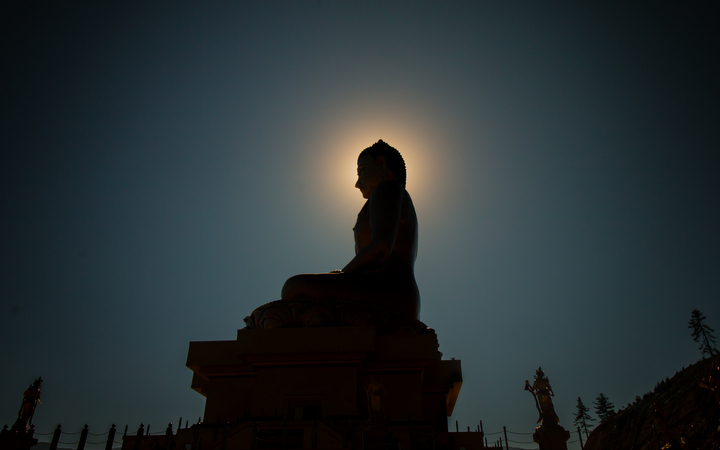Why are we here? Yoga is adamant in stating that ignorance leads to all other suffering. But not so much is said about how it all began. Why did I become ignorant? When? How? Find out more here.
Tag: life

Take Control Of Your Life
If you want life to be good, you have to make it happen. Self-responsibility is the key term for a great life. You have to command your life, take control of your life. Here I’ll talk about this and how why it’s so important.
The first step to having a better life is self-observation. First, you have to learn to look inside, to observe your thoughts, desires, and feelings. You should become the witness of your mind.
Once you’re aware of yourself, then comes the second essential step: self-responsibility. Now you have to take control of your life. You must understand that you have the potential to completely determine your degree of happiness, satisfaction, peace, enthusiasm and so forth. You and only you.
I teach this mantra to help you take control of your life:
“I have created the life I live”
Repeated it over and over again. Repeat it until you stop blaming anyone or anything else for your unhappiness. Repeat it until you understand that your life is your creation. You built it, you got here by your choices. You created your life as it is now, which means you can now define what kind of life you want.
Better yet, you have the power to immediately change your well-being.
In the Bhagavad-gita, Krishna says, “the yogi depends on no-one”. You don’t depend on anyone or anything. You only depend on your own ability to live better. An ability which you can develop more and more.
In the book, “The 3T Path” (https://3tpath.com/books/) you’ll that there is a wide range of techniques and facts you need to make this happen. These are techniques that have been successfully employed by yogis for thousands of years, and which science is confirming and explaining. It’s not a wave-of-the-wand empty promise. These are real steps you can take, from multiple angles, to take control of your mind and thus your life experience. From diet to meditation, from philosophy to devotion.
Somebody could ask, “Doesn’t God help me? Isn’t my life also the work of God? What about my parents and friends? Haven’t they help my life be what it is today?” The answer is YES. But, never underestimate your role in your good fortune. If you have friends and family to help you out, it’s because you’ve done something right to earn them. You’ve done something right to keep them dear to you and you dear to them. As for God, Krishna says plainly in the Gita: “I’m equal to all”. God is equal to all, of course. But, He says, if you ask for His help, He’ll help you. So, even when it comes to getting more divine mercy, it’s still up to you to make it happen. You have to ask for it.
Being grateful is one of the many things you can practice, as part of your effort to take control of your life, to have a better life. So, it still boils down to you having to take command of your mind to be happy.
So, take control of your life. Learn to live better. Understand that you have this power. You have the means to define the quality of your life. All you need is the know-how and then the grit to make it happen.
Watch my video on this topic here.
Look what they’re saying about The 3T Path book: “A spectacular book. I’m experiencing great transformations in my life!” – Elton Orvate

The 2 Things That Really Matter in Life
There are two things that really matter in life, which deserve your focus, because they’ll bring you the best of what life has to offer. I’m talking about dharma and bhakti. Understand what they are, and why they are important.
Dharma is a rich concept, and the word has many meanings, but my focus will be on dharma as that which needs to be done – essence and duty. Duty can be imposed; essence cannot. Dharma is thus that duty born of who you truly are, of your nature. It’s not an external or social imposition. It’s what you need to do at any given moment to be the best person you can be. It’s doing the right thing at the right time. Being dharmic is more than just doing good or avoiding hurtful or violent behavior, though that is certainly included in the concept, and it can’t be boiled down to a list of don’ts or things to be avoided. Dharma is fluid and alive and sensitive to different aspects of your life. Major changes to your dharma can occur from one second to the next. One way to understand dharma is to rephrase the classic line: “Don’t ask what the world can do for you, but ask what you can do for the world.”
There is immediate satisfaction in doing your dharma, because it means living your essence. When our actions are aligned with our dharma, we’re living life in its full potential, and this brings a deep sense of satisfaction. The passage of time in a life lived in dharma brings an unshakable sense of satisfaction, a profound feeling of having lived our purpose and of having done our best.
The final objective in yoga is love of God, divine love. Love is the purest and highest expression of the eternal individual self, the soul. And to love God the perfection of the ability to love. Yoga means “connection” and nothing creates a stronger and more beautiful connection than love. Connecting with God in love is called bhakti-yoga, or just bhakti. It’s not surprising that Krishna says in the Bhagavad-gita that, of all kinds of yogis, those who connect to Him in bhakti are the highest. Chapter after chapter, Krishna emphasizes that bhakti is the topmost and essential ingredient to achieve spiritual perfection, and that without it, it’s simply not possible to do so. The sage Patanjali also describes in the Yoga Sutras that “the perfection of the perfection of yoga” is achieved by “iswara pranidhana”, which means dedicating oneself to God.
Bhakti is love and to love is to live life to its perfection, for nothing is better than love. Life is the symptom of the soul and the perfection of the soul is to love. Loving God, the infinitely lovable, means to achieve the supreme perfection of existence. It’s the flux of life at its highest.
Thus, dharma and bhakti are what really matter in life. These two bring profound feelings of satisfaction and joy as we live them and accumulate over time to give a supreme sense of well-being. Everything else comes and goes, but these two provide long-lasting effects.
Sensory, superficial pleasures don’t last at all. That nice dinner you had, that cool movie, fun holiday, buying a new car, getting a promotion at work… none of these last. We can hardly remember them. Their pleasurable effects are ephemeral, and all too quickly fade away. To live life chasing these fleeting sensations of happiness which are gone in the blink of an eye is like trying fill a sieve with fine sand.
And, from the more esoteric aspect of revealed knowledge found in the sacred texts of yoga, we find that it’s precisely bhakti and dharma that we take with us beyond the grave. Bhakti is never lost, Krishna explains in the Bhagavad-gita, and dharma determines your next incarnation, if you haven’t yet practiced bhakti enough to become liberated from the cycle of birth and death.
So, be wise, and experience for yourself how good it is to invest in dharma and bhakti, at every moment of the day. In my new book, “The 3T Path – Self-improvement and Self-realization in Yoga”, I explain in detail the concepts of dharma and bhakti and how you can put them in practice in your life. You can find the book here: https://3tpath.com/books/.
Check out my video about this topic here.
Check out what they are saying about my new book: “I absolutely enjoyed this book by Giridhari Das. Enlightenment and Transformation: a good read!” – Jengel

